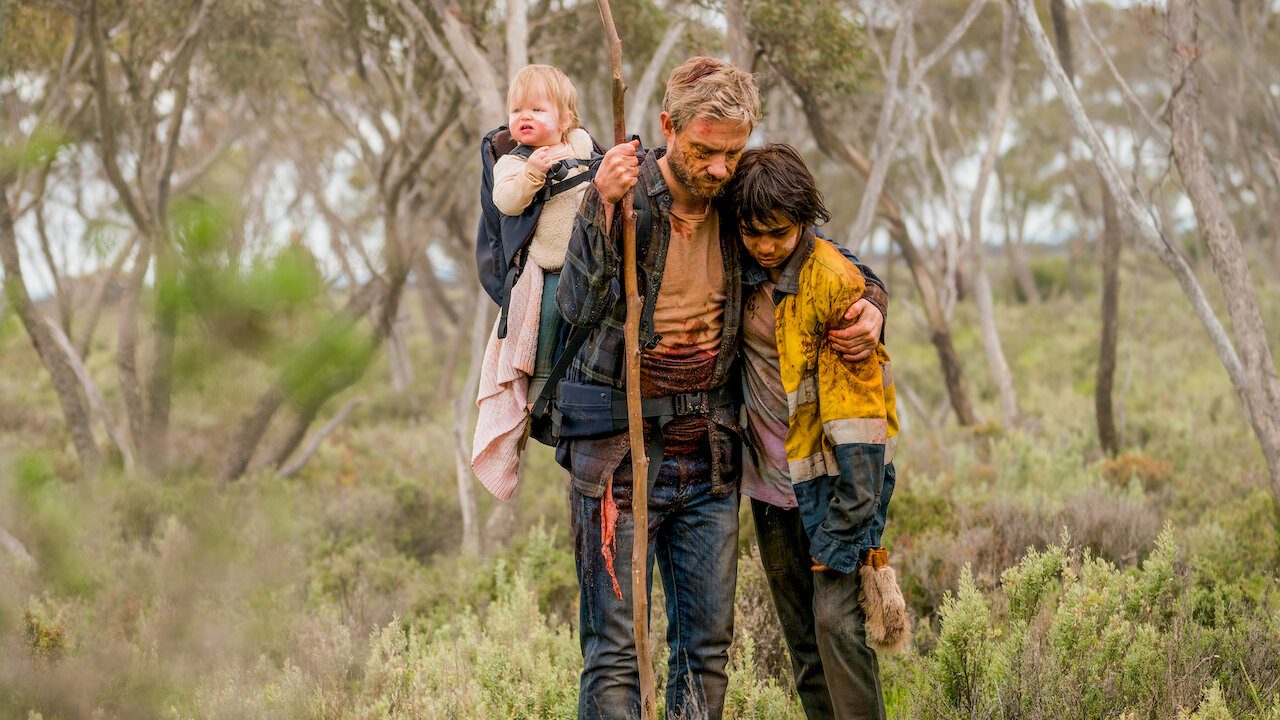Cargo (2017)

“Cargo,” directed by Ben Howling and Yolanda Ramke, and released in 2017, is an Australian post-apocalyptic thriller that offers a poignant exploration of survival, sacrifice, and the bonds of family in a world ravaged by a zombie-like plague. Based on the acclaimed 2013 short film of the same name, “Cargo” builds on its original premise to deliver a feature-length narrative that combines intense emotional drama with the gripping tension of a survival story. Featuring a standout performance by Martin Freeman, the film distinguishes itself within the zombie genre by focusing on the human experience and the moral dilemmas faced in a dystopian world.
“Cargo” is set in a desolate Australia, years after a deadly outbreak has turned much of the population into infected, zombie-like creatures. The film follows Andy (Martin Freeman), a father struggling to protect his infant daughter, Rosie, after being bitten by an infected. Knowing he has limited time before succumbing to the infection, Andy embarks on a desperate journey to find safety and a new guardian for Rosie. His quest leads him through the Australian outback, where he encounters various survivors and dangerous situations, all while grappling with the impending loss of his humanity.
The plot is driven by Andy’s determination to ensure that Rosie is cared for in a world where hope is scarce. Along the way, he encounters other survivors, each with their own stories and struggles, reflecting the broader impact of the apocalypse on human behavior and society. The film’s tension comes not only from the constant threat of infection but also from the ethical decisions Andy must make as he navigates the harsh realities of his world.

“Cargo” delves into several central themes, including survival, sacrifice, and the nature of humanity. The film’s primary theme is survival in a world where traditional values and social structures have collapsed. Andy’s journey is a testament to the lengths a parent will go to for the sake of their child, highlighting the primal instincts and profound love that drive human behavior in extreme situations.
Sacrifice is another key theme, as Andy must confront the reality of his own mortality and the impact it will have on Rosie. His determination to find a suitable guardian for his daughter reflects a deep sense of responsibility and selflessness. The film portrays the emotional and psychological toll of facing one’s own end while striving to ensure a better future for a loved one.
The nature of humanity is explored through the interactions between characters and the moral choices they face. The film raises questions about what it means to remain human in a world where humanity itself is under threat. The survivors Andy meets each represent different facets of human nature, from altruism to ruthlessness, underscoring the complexity of human responses to extreme circumstances.

“Cargo” employs a gritty and realistic visual style to enhance its depiction of the post-apocalyptic world. The film’s cinematography, led by Tim Hudson, captures the stark, barren landscape of the Australian outback, creating a desolate and unforgiving environment. The use of natural lighting and handheld camera work adds to the film’s raw and immersive feel, drawing viewers into the bleak reality faced by the characters.
The practical effects used to portray the infected are understated yet effective, contributing to the film’s realistic and unsettling atmosphere. Unlike some zombie films that focus on gore and spectacle, “Cargo” opts for a more restrained approach, allowing the emotional weight of the story to take precedence.
The musical score for “Cargo,” composed by Amanda Brown, plays a crucial role in setting the film’s tone and amplifying its emotional impact. Brown’s score features haunting and evocative themes that enhance the film’s atmosphere of dread and melancholy. The music underscores key moments of tension and emotional resonance, reinforcing the film’s exploration of loss and hope.

“Cargo” received positive reviews from critics, who praised its emotional depth, Martin Freeman’s performance, and its fresh approach to the zombie genre. The film was noted for its focus on character development and the human element of the story, distinguishing it from more traditional zombie films that often prioritize action and horror.
The film’s reception reflects a growing interest in stories that blend genre elements with deep emotional and ethical considerations. “Cargo” has been recognized for its ability to convey a powerful narrative within the confines of the zombie genre, offering a unique and thought-provoking viewing experience.
“Cargo” (2017) stands out as a poignant and compelling entry in the post-apocalyptic genre, combining survival drama with an exploration of human emotions and ethical dilemmas. Directed by Ben Howling and Yolanda Ramke, and featuring a memorable performance by Martin Freeman, the film delivers a gripping narrative that focuses on the bonds of family and the struggle to maintain humanity in a world overwhelmed by despair. Through its realistic portrayal of a ravaged world, emotional depth, and strong character development, “Cargo” offers a fresh and impactful take on the zombie genre, making it a notable and thought-provoking film in contemporary cinema.










